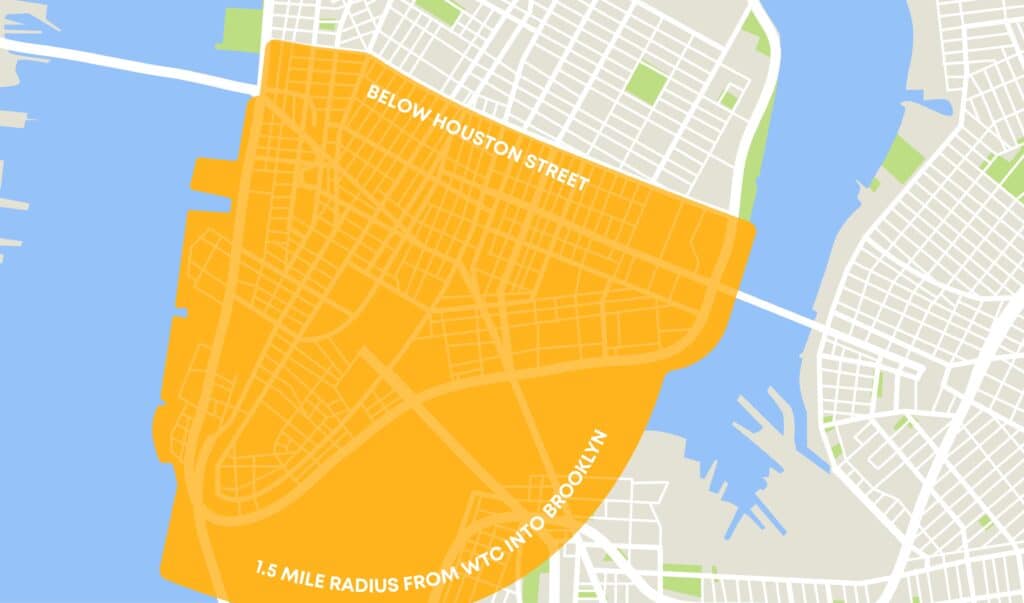
The toxic dust cloud and fire fumes that enveloped New York City in the aftermath of the 9/11 attacks have caused a wide range of health problems for responders and survivors—and among the most serious are the digestive system and gastrointestinal disorders.
For months, responders, residents, workers, and students breathed in this unsafe air as they aided in the cleanup or simply returned to “normal life”. For many, this risked their long-term respiratory, digestive, and mental health.
The effects of toxic dust exposure
Over 70 types of cancer have been associated with the 9/11 exposure zone, as well as digestive, respiratory, and mental health illnesses.
These health problems resulted from exposure to toxic and poisonous dust that formed from building materials, jet fuel, and gas—a lethal concoction that was inhaled and declared “safe” at the time by the EPA.
Symptoms of the most serious digestive and gastrointestinal illnesses sometimes showed within days or weeks of the exposure but other conditions developed years later. Responders and survivors are still reporting new conditions to this day, often with complicated diseases requiring extensive treatment.
9/11 digestive conditions vary from gastroesophageal reflux disease to life-threatening cancers while many also suffered from crippling asthma and lung conditions. Often, these are interconnected, with individuals suffering from multiple conditions. For instance, gastrointestinal issues have been found in many people also suffering from WTC cough syndrome.
Long-term effects of gastrointestinal disease caused by 9/11
Digestive and gastrointestinal diseases caused by 9/11 dust exposure can have a long-term impact on an individual’s health.
Pain, nausea, chronic cough, and difficulty with digestion are some of the more obvious symptoms that have been associated with exposure. These symptoms can be debilitating and greatly impact quality of life.
Adverse health conditions such as chronic inflammation of the stomach lining, malabsorption of nutrients, and the development of gastrointestinal cancers are often more difficult to diagnose.
Individuals affected by any 9/11-related digestive symptoms are encouraged to seek assistance for their conditions via the World Trade Center Health Program (WTCHP), which provides free medical monitoring and treatment. Registration with the September 11th Victim Compensation Fund (VCF) can also lead to compensation.
The main 9/11 cancers associated with the digestive system
Following is a brief rundown of the main types of digestive system and gastrointestinal cancers associated with 9/11 dust exposure.
How are 9/11 digestive system cancers typically treated?
The WTC Health Program was set up specifically to assist those who have suffered a 9/11-related injury, illness, health condition or injury.
Anyone present in the exposure zone of the toxic dust cloud during the eligible dates after the attacks, who subsequently develops a digestive system cancer outlined above (or any of the other 70-plus cancers that are covered) is entitled to full medical monitoring and free treatment from experienced doctors via the program.
Typically, this may involve one or more of the following types of treatment:
If the cancer is localized, an operation may be able to remove all of the cancerous tissue. If the cancer has spread to other areas of the body, doctors will need to assess whether surgery can improve the quality of life of the patient.
Digestive system surgery can sometimes lead to significant complications, making eating and going to the bathroom more challenging. This needs to be considered before a decision is made to proceed with surgery.
To discuss your situation and learn more about how we may be able to help you, please call Weisfuse & Weisfuse, LLP at 212-983-3000 or contact us online to schedule a free consultation.

About Jason Weisfuse –
9/11 Victim Compensation Fund Attorney
About Jason Weisfuse –
9/11 Victim Compensation Fund Attorney
Jason E. Weisfuse is a seasoned 9/11 cancer attorney and managing partner at Weisfuse & Weisfuse, LLP, a New York City-based law firm dedicated to representing individuals affected by the September 11th attacks. Since the establishment of the September 11th Victim Compensation Fund (VCF), Jason has been instrumental in assisting first responders, survivors, and families in securing the compensation and medical benefits they deserve.
With a Juris Doctor from New York Law School (2009), Jason brings extensive experience regarding the 9/11 Victim Compensation Fund to his practice. His deep understanding of the VCF and the World Trade Center Health Program (WTCHP) has enabled him to navigate complex claims processes effectively, resulting in substantial awards for his clients.
Jason’s commitment to the victims in the 9/11 community is evident through his active involvement in professional organizations such as the New York State Trial Lawyers Association and the American Association for Justice. He has also contributed to legal discourse with publications in the New York Law Journal, reflecting his dedication to legal excellence and advocacy.
At Weisfuse & Weisfuse, LLP, Jason continues to provide compassionate and knowledgeable representation, ensuring that those affected by 9/11 receive the support and compensation they are entitled to.







